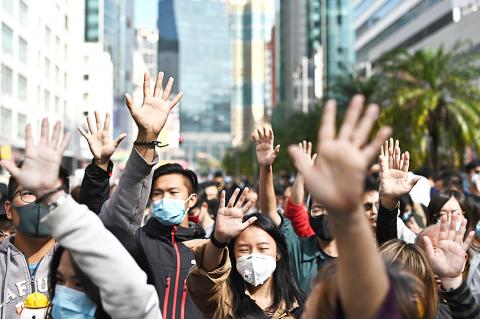Hong Kong police yesterday ended their blockade of the Hong Kong Polytechnic University campus after surrounding it for 12 days to try to arrest pro-democracy protesters holed up inside.
Police removed a stash of nearly 4,000 gasoline bombs left behind by protesters, who fought pitched battles about two weeks ago with riot officers on surrounding streets.
About 100 officers first entered the campus on Thursday to collect materials and remove dangerous items.

Photo: AFP
A police statement said that over two days, they seized 3,989 gasoline bombs, 1,339 explosive items, 601 bottles of corrosive liquids and 573 weapons.
No protesters were found.
One masked man told reporters that the night before police entered the campus about 20 people were still hiding to avoid arrest.
They were the holdouts from perhaps 1,100 people who had retreated inside after the battles with police.
A few escaped the cordon, but police said that they arrested 810 people and recorded the details of 300 minors who could later face charges.
Another 567 people were arrested in the vicinity of the university, police said.
A university official estimated that it would take five to six months to repair the damage to the campus.
During an official visit to Thailand, Hong Kong Chief Executive Carrie Lam (林鄭月娥) said that Hong Kong is undergoing a difficult period, but that the fundamentals of the territory, including its strengths under the “one country, two systems” framework, remain strong.
“I and my government are listening to our people with a view to resolving some deep-seated problems in Hong Kong through dialogue,” she said. “I have every confidence that Hong Kong can bounce back, as we always do.”
Hundreds of people yesterday chanted pro-democracy slogans at lunchtime rallies across Hong Kong. Some carried posters featuring US President Donald Trump. Other posters told Lam that “it’s time to step down.”
The latest protests followed a large rally on Thursday night to thank the US — on the country’s Thanksgiving Day holiday — after Trump signed into law legislation supporting the protesters.
Chanting: “Fight for freedom, stand with Hong Kong,” thousands of people waved US flags and urged other countries to join the US in supporting human rights in Hong Kong.

MAKING WAVES: China’s maritime militia could become a nontraditional threat in war, clogging up shipping lanes to prevent US or Japanese intervention, a report said About 1,900 Chinese ships flying flags of convenience and fishing vessels that participated in China’s military exercises around Taiwan last month and in January last year have been listed for monitoring, Coast Guard Administration (CGA) Deputy Director-General Hsieh Ching-chin (謝慶欽) said yesterday. Following amendments to the Commercial Port Act (商港法) and the Law of Ships (船舶法) last month, the CGA can designate possible berthing areas or deny ports of call for vessels suspected of loitering around areas where undersea cables can be accessed, Oceans Affairs Council Minister Kuan Bi-ling (管碧玲) said. The list of suspected ships, originally 300, had risen to about

DAREDEVIL: Honnold said it had always been a dream of his to climb Taipei 101, while a Netflix producer said the skyscraper was ‘a real icon of this country’ US climber Alex Honnold yesterday took on Taiwan’s tallest building, becoming the first person to scale Taipei 101 without a rope, harness or safety net. Hundreds of spectators gathered at the base of the 101-story skyscraper to watch Honnold, 40, embark on his daredevil feat, which was also broadcast live on Netflix. Dressed in a red T-shirt and yellow custom-made climbing shoes, Honnold swiftly moved up the southeast face of the glass and steel building. At one point, he stepped onto a platform midway up to wave down at fans and onlookers who were taking photos. People watching from inside

Japan’s strategic alliance with the US would collapse if Tokyo were to turn away from a conflict in Taiwan, Japanese Prime Minister Sanae Takaichi said yesterday, but distanced herself from previous comments that suggested a possible military response in such an event. Takaichi expressed her latest views on a nationally broadcast TV program late on Monday, where an opposition party leader criticized her for igniting tensions with China with the earlier remarks. Ties between Japan and China have sunk to the worst level in years after Takaichi said in November that a hypothetical Chinese attack on Taiwan could bring about a Japanese

STREAMLINED: The dedicated funding would allow the US to transfer equipment to Taiwan when needed and order upgraded replacements for stockpiles, a source said The US House of Representatives on Thursday passed a defense appropriations bill totaling US$838.7 billion, of which US$1 billion is to be allocated to reinforcing security cooperation with Taiwan and US$150 million to replace defense articles provided to the nation. These are part of the Consolidated Appropriation Act, which the US House yesterday passed with 341 votes in favor and 88 against. The act must be passed by the US Senate before Friday next week to avoid another government shutdown. The US House Committee on Appropriations on Monday unveiled the act, saying that it allocates US$1 billion for the Taiwan Security Cooperation Initiative